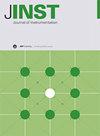Generalizing to new geometries with Geometry-Aware Autoregressive Models (GAAMs) for fast calorimeter simulation
IF 1.3
4区 工程技术
Q3 INSTRUMENTS & INSTRUMENTATION
引用次数: 2
Abstract
Abstract Generation of simulated detector response to collision products is crucial to data analysis in particle physics, but computationally very expensive. One subdetector, the calorimeter, dominates the computational time due to the high granularity of its cells and complexity of the interactions. Generative models can provide more rapid sample production, but currently require significant effort to optimize performance for specific detector geometries, often requiring many models to describe the varying cell sizes and arrangements, without the ability to generalize to other geometries. We develop a geometry-aware autoregressive model, which learns how the calorimeter response varies with geometry, and is capable of generating simulated responses to unseen geometries without additional training. The geometry-aware model outperforms a baseline unaware model by over 50% in several metrics such as the Wasserstein distance between the generated and the true distributions of key quantities which summarize the simulated response. A single geometry-aware model could replace the hundreds of generative models currently designed for calorimeter simulation by physicists analyzing data collected at the Large Hadron Collider. This proof-of-concept study motivates the design of a foundational model that will be a crucial tool for the study of future detectors, dramatically reducing the large upfront investment usually needed to develop generative calorimeter models.将几何感知自回归模型(GAAMs)推广到新的几何形状,用于快速量热计模拟
在粒子物理中,模拟探测器对碰撞产物的响应是数据分析的关键,但计算成本非常高。其中一个子检测器,量热计,由于其细胞的高粒度和相互作用的复杂性,支配了计算时间。生成模型可以提供更快速的样品生产,但目前需要大量的努力来优化特定探测器几何形状的性能,通常需要许多模型来描述不同的细胞大小和排列,而不能推广到其他几何形状。我们开发了一个几何感知的自回归模型,该模型可以学习量热计的响应如何随几何形状而变化,并且能够在没有额外训练的情况下生成对未见几何形状的模拟响应。几何感知模型在几个指标上优于基线不感知模型50%以上,例如生成的和总结模拟响应的关键数量的真实分布之间的Wasserstein距离。一个单一的几何感知模型可以取代目前为物理学家分析大型强子对撞机收集的数据而设计的数百种生成模型。这项概念验证研究激发了基础模型的设计,该模型将成为未来探测器研究的关键工具,大大减少了开发生成式量热计模型通常需要的大量前期投资。
本文章由计算机程序翻译,如有差异,请以英文原文为准。
求助全文
约1分钟内获得全文
求助全文
来源期刊

Journal of Instrumentation
工程技术-仪器仪表
CiteScore
2.40
自引率
15.40%
发文量
827
审稿时长
7.5 months
期刊介绍:
Journal of Instrumentation (JINST) covers major areas related to concepts and instrumentation in detector physics, accelerator science and associated experimental methods and techniques, theory, modelling and simulations. The main subject areas include.
-Accelerators: concepts, modelling, simulations and sources-
Instrumentation and hardware for accelerators: particles, synchrotron radiation, neutrons-
Detector physics: concepts, processes, methods, modelling and simulations-
Detectors, apparatus and methods for particle, astroparticle, nuclear, atomic, and molecular physics-
Instrumentation and methods for plasma research-
Methods and apparatus for astronomy and astrophysics-
Detectors, methods and apparatus for biomedical applications, life sciences and material research-
Instrumentation and techniques for medical imaging, diagnostics and therapy-
Instrumentation and techniques for dosimetry, monitoring and radiation damage-
Detectors, instrumentation and methods for non-destructive tests (NDT)-
Detector readout concepts, electronics and data acquisition methods-
Algorithms, software and data reduction methods-
Materials and associated technologies, etc.-
Engineering and technical issues.
JINST also includes a section dedicated to technical reports and instrumentation theses.
 求助内容:
求助内容: 应助结果提醒方式:
应助结果提醒方式:


